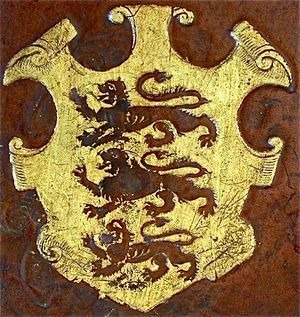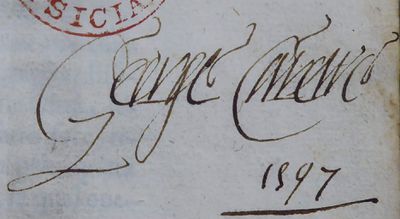Difference between revisions of "George Carew 1555-1629"
m (Text replacement - "crossreferences" to "crossreference") |
(→Books) |
||
| Line 6: | Line 6: | ||
====Books==== | ====Books==== | ||
| − | Surviving books (well over 50 can be traced, widely distributed around many libraries) show that Carew had a substantial library. He had books in [[language::English]], [[language::Latin]], [[language::French]], [[language::Italian]] and [[language::Spanish]] including numerous titles on [[subject::military|military theory and practice]]. He had antiquarian interests relating particularly to [[subject::history | + | Surviving books (well over 50 can be traced, widely distributed around many libraries) show that Carew had a substantial library. He had books in [[language::English]], [[language::Latin]], [[language::French]], [[language::Italian]] and [[language::Spanish]] including numerous titles on [[subject::military affairs|military theory and practice]]. He had antiquarian interests relating particularly to [[subject::history|Irish history]], most of which are now divided between the [[present repository::Bodleian library|Bodleian]] and [[present repository::Lambeth Palace Library]]. He was a friend and patron of contemporary antiquaries, including [[crossreference::William Camden]], [[crossreference::Sir Robert Cotton]] and [[associates::Sir Thomas Bodley]]. In his will, he [[bequest::bequeathed]] all his books and [[format::manuscript|manuscripts]] to [[beneficiary::Sir Thomas Stafford]] (d.[[date of death::1655]], reputedly his illegitimate son), after whose death they were sold by his widow to the [[location::London]] bookseller [[subsequent owner::Cornelius Bee]], though the [[format::manuscript|manuscripts]] are said to have been given or sold earlier by Stafford to Archbishop [[crossreference::William Laud|Laud]]. Examples: BL C.68.c.5, C.66.h.2; CUL T.3.5, Rel.c.58.1; Bodleian 4to F.13.Jur.Seld., 4to V.17.Th.Seld; Durham UL Cosin R.3.1; Lincoln College, Oxford N.9.31. |
[[file:Carew-detail-phq4qLP9.jpg | thumb| 400px |Carew’s inscription, dated 1597, from a titlepage: Royal College of Physicians of London D1/4-d-13, B. Lorini, ''Delle Fortificationi'', 1597]] | [[file:Carew-detail-phq4qLP9.jpg | thumb| 400px |Carew’s inscription, dated 1597, from a titlepage: Royal College of Physicians of London D1/4-d-13, B. Lorini, ''Delle Fortificationi'', 1597]] | ||
| + | |||
====Characteristic markings==== | ====Characteristic markings==== | ||
Carew used five armorial binding stamps, all showing his main coat of arms, one of which is regularly found on books from his library. Many of his bindings are in vellum, otherwise in calfskin, and the arms are often handpainted to show the correct heraldic tinctures. He sometimes inscribed his titlepages with his name and date of acquisition, but his books are not typically otherwise annotated. A series of capital letters (A to D) sometimes found on the flyleaves or titlepages of his books seem to indicate a simple shelfmarking system. | Carew used five armorial binding stamps, all showing his main coat of arms, one of which is regularly found on books from his library. Many of his bindings are in vellum, otherwise in calfskin, and the arms are often handpainted to show the correct heraldic tinctures. He sometimes inscribed his titlepages with his name and date of acquisition, but his books are not typically otherwise annotated. A series of capital letters (A to D) sometimes found on the flyleaves or titlepages of his books seem to indicate a simple shelfmarking system. | ||
Revision as of 02:06, 10 August 2020
George CAREW, Earl of Totnes 1555-1629
Biographical Note
Son of George Carew, Dean of Bristol and later of Exeter. Attended Broadgates Hall, Oxford 1564-73; MA 1589. He spent the early part of his career as a soldier, primarily in Ireland; sheriff of County Carlow 1583, master of the ordnance in Ireland 1588. Participated in the Earl of Essex's expeditions to Cadiz in 1596 and the Azores in 1597. Lord President of Munster 1600-04, where he successfully suppressed a rebellion. After James I's accession he was based more in England, where he held a number of state positions, including master of the ordnance (1608) and governor of Guernsey (1610). he was made Baron Carew of Clopton in 1605, and Earl of Totnes in 1626. He retained an involvement with Irish affairs, including the plantation of Ulster.
Books
Surviving books (well over 50 can be traced, widely distributed around many libraries) show that Carew had a substantial library. He had books in English, Latin, French, Italian and Spanish including numerous titles on military theory and practice. He had antiquarian interests relating particularly to Irish history, most of which are now divided between the Bodleian and Lambeth Palace Library. He was a friend and patron of contemporary antiquaries, including William Camden, Sir Robert Cotton and Sir Thomas Bodley. In his will, he bequeathed all his books and manuscripts to Sir Thomas Stafford (d.1655, reputedly his illegitimate son), after whose death they were sold by his widow to the London bookseller Cornelius Bee, though the manuscripts are said to have been given or sold earlier by Stafford to Archbishop Laud. Examples: BL C.68.c.5, C.66.h.2; CUL T.3.5, Rel.c.58.1; Bodleian 4to F.13.Jur.Seld., 4to V.17.Th.Seld; Durham UL Cosin R.3.1; Lincoln College, Oxford N.9.31.
Characteristic markings
Carew used five armorial binding stamps, all showing his main coat of arms, one of which is regularly found on books from his library. Many of his bindings are in vellum, otherwise in calfskin, and the arms are often handpainted to show the correct heraldic tinctures. He sometimes inscribed his titlepages with his name and date of acquisition, but his books are not typically otherwise annotated. A series of capital letters (A to D) sometimes found on the flyleaves or titlepages of his books seem to indicate a simple shelfmarking system.
Sources
- British Armorial Bindings.
- Will of George Lord Carew Baron of Clopton.
- St John's College, Cambridge, "Gold-stamped arms of George Carew, Earl of Totnes (1555-1629)".
- Lotz-Heumann, Ute. "Carew, George, earl of Totnes (1555–1629), soldier and administrator", Oxford Dictionary of National Biography.
- James, M. R. "The Carew manuscripts", English Historical Review 42 (1927), 261-267.

